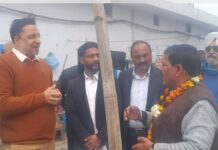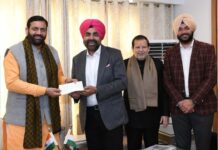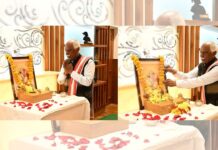DISCUSSION ON BOOK “MASHKOH: KARGIL AS I SAW IT” PENNED BY BRIG UMESH SINGH BAWA HELD ON FIRST DAY OF MILITARY LITERATURE FESTIVAL
DISCUSSION MODERATED BY SENIOR JOURNALIST RAMESH VINAYAK & ATTENDED BY MAJ GEN AMARJIT SINGH & SENIOR JOURNALIST MANRAJ GREWAL SHARMA
Chandigarh, December 18:
During the Kargil war of 1999, Brig Umesh Singh Bawa was commanding 17 Jat and his unit was instrumental in the capture of Pimple Complex, part of point 4875 in Mashkoh valley. Upon his retirement, Brig Bawa has penned a book titled “Mashkoh: Kargil As I Saw It”.
On the opening day of 4th edition of Military Literature Festival, which is being organised in virtual mode this time, a discussion on book “Mashkoh: Kargil As I Saw It” was held. This discussion was moderated by Resident Editor of HT Mr Ramesh Vinayak and the other participants included Maj Gen Amarjit Singh and Resident Editor of Indian Express Mrs Manraj Grewal Sharma.
This book is a first-hand authentic account of war stories of the ‘Mashkoh Warriors’ by Brig Umesh Singh Bawa, who commanded the 17 Jat during the Kargil War and was awarded Vir Chakra for his gallant actions in the Mashkoh Valley in 1999.
Mr Ramesh Vinayak shared that during the Kargil War, he had visited the area and had reported for India Today at that time. He shared that this book has been written in such a manner that if one starts reading it, one cannot stop before finishing it till the end.
Brig Bawa shared that main aim of writing this book is sharing lessons of war for future generations so that when new wars begin and end, such crucial lessons will not have to be “relearned-rewritten in more blood,” he said. He said that this book would showcase that the mistakes we made during the Kargil War should not be repeated and it is his way of telling the world about the sacrifices and bravery of the soldiers of 17 Jat. He also informed that this book has been written during free time due to lockdown.
Maj Gen Amarjit Singh said that this book has been penned by Brig Bawa, who has remained on the battlefield and fought braving the bullets during the Kargil War and is a first hand account of what actually happened. He said that sometimes, people who write military history have not been in the war in person and is merely a second hand account. But this book gives a first hand account of what actually happened in the strategically located Mashkoh Valley.
Mrs Manraj Grewal Sharma shared that this book also contains a chapter about lessons which media reporting the war should know. Brig Bawa said that a lot of media was covering some other areas during the Kargil War, but Mashkoh Valley was in the interiors and was strategically located. “The reason for our success in Mashkoh Valley was because my troops were already acclimatised as we were already deputed in a high altitude area somewhere else. So that way, my troops had an edge over others and fought bravely,” he shared.
Brig Bawa further shared that the enemy was surrounded from three different directions and his troops had established a firm base with multiple options from three different directions. “Western side was used to deceive the enemy, whereas the troops had actually decided to launch the assault from south and south eastern direction. It was due to this deception plan that the enemy could not know from where the attack is coming and it helped us,” he said.
Maj Gen Amarjit Singh said that the Kargil War was being fought at an altitude of 16000 feet, where taking even one step is difficult, “And we salute our soldiers who fought so bravely at that altitude. They not only fought but even won us this war,” he shared.
Brig Umesh Singh Bawa also shared that he has also mentioned in the book that surveillance is the most important in any war, “and over the years, our capabilities have improved and lots of equipment has been purchased. He said that a country with better surveillance always have an edge over their opponent.”
He also shared his thoughts on media as to what to report and what not to keeping in mind security of our country. “Media and army should always join hands for raising morale of troops and civilians. Wrong things should be reported after the war is over and not during the war.”
He further shared that this book captures the tales of bravery, humour, emotions, tragic losses and hard-won victories in extremely challenging high-altitude terrain of Kargil, where many believed that the mission was impossible.

 हिंदी
हिंदी






